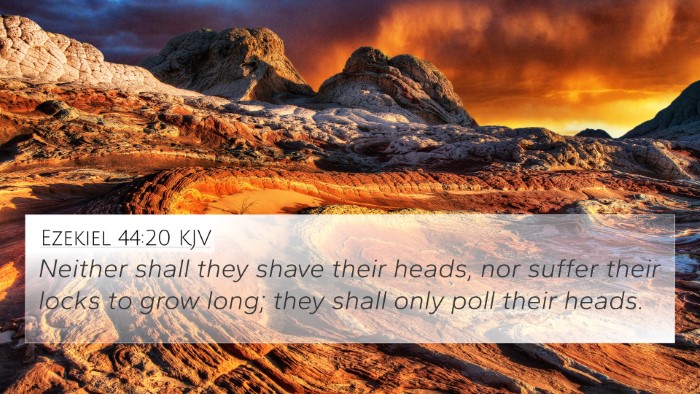Understanding 2 Samuel 14:26
2 Samuel 14:26 states, "And when he polled his head, (for it was at every year's end that he polled it: because the hair was heavy on him, therefore he polled it:) he weighed the hair of his head at two hundred shekels after the king's weight." This verse speaks to various themes, including the significance of appearance, cultural practices regarding hair, and the symbolism attached to it.
Summary of Meaning
This verse describes Absalom, the son of King David, and his annual practice of cutting his hair. The act of weighing his hair serves as a metaphor for his pride and vanity. The weighty hair reflects his status and beauty, which becomes a crucial aspect of his character in the narrative.
Commentary Insights
-
Matthew Henry:
Henry emphasizes that Absalom's hair symbolizes his beauty and pride. The cutting of his hair each year is associated with a time of self-assessment and possibly vanity. This vanity ultimately plays a role in his downfall.
-
Albert Barnes:
Barnes points out that the shekel weight of his hair could illustrate the esteem in which he was held by others. It marks the transition from physical beauty to the spiritual decay that often accompanies such vanity.
-
Adam Clarke:
Clarke notes that Absalom's hair was not merely a symbol of beauty but also reflected his rebellious spirit. It invites contemplation about the fine line between pride and righteousness in one's actions.
Cross-References and Thematic Connections
To understand the broader implications of 2 Samuel 14:26, it is helpful to look at cross-references that illuminate various themes, including vanity, pride, and consequences of one's actions.
- 1 Samuel 16:7: "For the Lord sees not as man sees: man looks on the outward appearance, but the Lord looks on the heart." This emphasizes the contrast between external beauty and internal character.
- Proverbs 16:5: "Everyone who is arrogant in heart is an abomination to the Lord; be assured, he will not go unpunished." This verse warns against pride, a central theme in Absalom's character.
- 2 Samuel 18:9: The imagery of Absalom’s hair ultimately led to his demise when it got caught in the boughs of a tree, leading to his death. This serves as a stark reminder of the consequences of pride.
- Proverbs 11:2: "When pride comes, then comes disgrace, but with the humble is wisdom." This illustrates the moral consequences of vanity as seen in Absalom.
- James 4:6: "But he gives more grace. Therefore it says, 'God opposes the proud, but gives grace to the humble.'" The New Testament reinforces Old Testament lessons on humility.
- Luke 14:11: "For everyone who exalts himself will be humbled, and he who humbles himself will be exalted." This echoes the theme of humility contrasted with Absalom’s pride.
- Matthew 23:12: "Whoever exalts himself will be humbled, and whoever humbles himself will be exalted." A tying of themes across both the Old Testament and New Testament regarding pride and humility.
Implications for Spiritual Reflection
As believers reflect on 2 Samuel 14:26, they are invited to consider their approach to personal appearance and pride. Does it distract from one's spiritual journey? How can one balance acknowledging beauty while remaining humble? The reflections of various commentators provide a holistic perspective on these questions.
Utilizing Biblical Cross-Referencing Tools
For those looking to dive deeper into comparative Bible analysis or seeking resources for linking Bible scriptures, there are numerous tools available:
- Using a Bible concordance can help find specific themes and words, assisting in your study of 2 Samuel 14:26.
- Employing a Bible cross-reference guide can illuminate connections between this verse and others.
- Engaging in cross-reference Bible study enhances understanding of the scripture as a whole.
Conclusion
2 Samuel 14:26 serves not only as a narrative detail concerning Absalom but also as a lesson on the dangers of vanity and pride, illustrated through various biblical themes. By considering this verse alongside its numerous cross-references, believers can gain profound insights into their own spiritual lives, guiding them toward humility and away from the pitfalls of pride.









